十个最常用的英语习语
流行的常用英语习语大全1
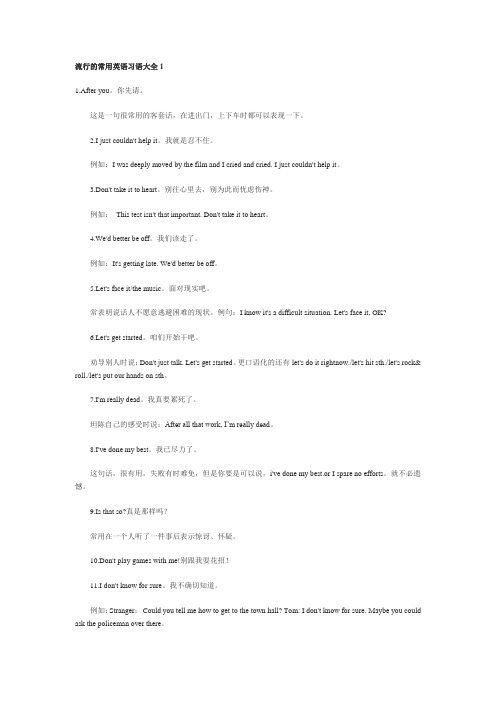
流行的常用英语习语大全11.After you。
你先请。
这是一句很常用的客套话,在进出门,上下车时都可以表现一下。
2.I just couldn't help it。
我就是忍不住。
例如:I was deeply moved by the film and I cried and cried. I just couldn't help it。
3.Don't take it to heart。
别往心里去,别为此而忧虑伤神。
例如:This test isn't that important. Don't take it to heart。
4.We'd better be off。
我们该走了。
例如:It's getting late. We'd better be off。
5.Let's face it/the music。
面对现实吧。
常表明说话人不愿意逃避困难的现状。
例句:I know it's a difficult situation. Let's face it, OK?6.Let's get started。
咱们开始干吧。
劝导别人时说:Don't just talk. Let's get started。
更口语化的还有let's do it rightnow./let's hit sth./let's rock& roll./let's put our hands on sth。
7.I'm really dead。
我真要累死了。
坦陈自己的感受时说:After all that work, I’m really dead。
8.I've done my best。
我已尽力了。
这句话,很有用,失败有时难免,但是你要是可以说,i've done my best.or I spare no efforts。
普通英语和商务英语中常常使用的10个习语-盐城纳斯达克英语
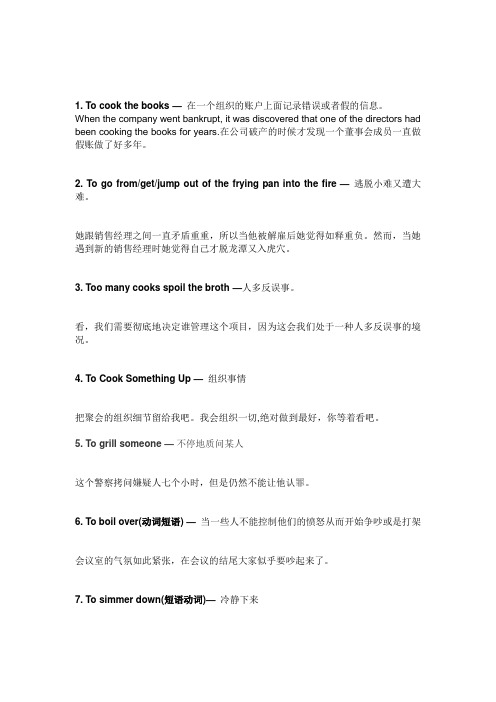
1. To cook the books—在一个组织的账户上面记录错误或者假的信息。
When the company went bankrupt, it was discovered that one of the directors had been cooking the books for years.在公司破产的时候才发现一个董事会成员一直做假账做了好多年。
2. To go from/get/jump out of the frying pan into the fire—逃脱小难又遭大难。
她跟销售经理之间一直矛盾重重,所以当他被解雇后她觉得如释重负。
然而,当她遇到新的销售经理时她觉得自己才脱龙潭又入虎穴。
3. Too many cooks spoil the broth—人多反误事。
看,我们需要彻底地决定谁管理这个项目,因为这会我们处于一种人多反误事的境况。
4. To Cook Something Up—组织事情把聚会的组织细节留给我吧。
我会组织一切,绝对做到最好,你等着看吧。
5. To grill someone —不停地质问某人这个警察拷问嫌疑人七个小时,但是仍然不能让他认罪。
6. To boil over(动词短语)—当一些人不能控制他们的愤怒从而开始争吵或是打架会议室的气氛如此紧张,在会议的结尾大家似乎要吵起来了。
7. To simmer down(短语动词)—冷静下来嘿.冷静下来放松。
生气改变不了任何事情。
8. To simmer with rage/anger—像愤怒和生气一样充满负面情绪当苏珊看到建筑者们引起的延展性的灾难时,气不打一处来。
9. To stew or to be in a stew —使其处于烦恼中After the interrogation, the police let Tom stew for a few hours before releasing him.审问过后,警察在释放汤姆之前,让他烦恼了一会。
英语习语与西方文化
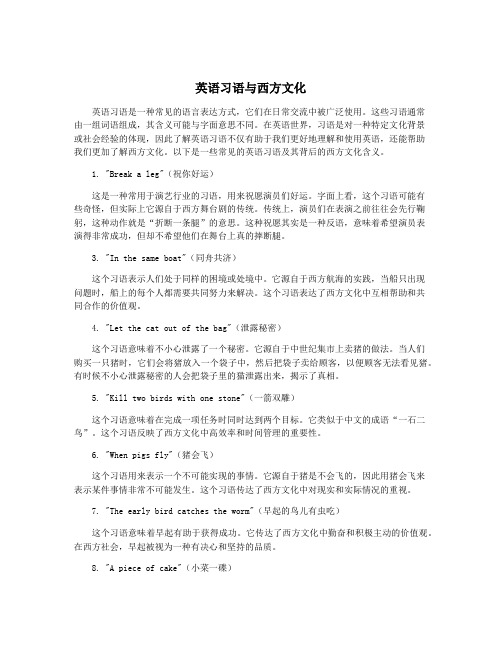
英语习语与西方文化英语习语是一种常见的语言表达方式,它们在日常交流中被广泛使用。
这些习语通常由一组词语组成,其含义可能与字面意思不同。
在英语世界,习语是对一种特定文化背景或社会经验的体现,因此了解英语习语不仅有助于我们更好地理解和使用英语,还能帮助我们更加了解西方文化。
以下是一些常见的英语习语及其背后的西方文化含义。
1. "Break a leg"(祝你好运)这是一种常用于演艺行业的习语,用来祝愿演员们好运。
字面上看,这个习语可能有些奇怪,但实际上它源自于西方舞台剧的传统。
传统上,演员们在表演之前往往会先行鞠躬,这种动作就是“折断一条腿”的意思。
这种祝愿其实是一种反语,意味着希望演员表演得非常成功,但却不希望他们在舞台上真的摔断腿。
3. "In the same boat"(同舟共济)这个习语表示人们处于同样的困境或处境中。
它源自于西方航海的实践,当船只出现问题时,船上的每个人都需要共同努力来解决。
这个习语表达了西方文化中互相帮助和共同合作的价值观。
4. "Let the cat out of the bag"(泄露秘密)这个习语意味着不小心泄露了一个秘密。
它源自于中世纪集市上卖猪的做法。
当人们购买一只猪时,它们会将猪放入一个袋子中,然后把袋子卖给顾客,以便顾客无法看见猪。
有时候不小心泄露秘密的人会把袋子里的猫泄露出来,揭示了真相。
5. "Kill two birds with one stone"(一箭双雕)这个习语意味着在完成一项任务时同时达到两个目标。
它类似于中文的成语“一石二鸟”。
这个习语反映了西方文化中高效率和时间管理的重要性。
6. "When pigs fly"(猪会飞)这个习语用来表示一个不可能实现的事情。
它源自于猪是不会飞的,因此用猪会飞来表示某件事情非常不可能发生。
这个习语传达了西方文化中对现实和实际情况的重视。
高中常用英语习语80条
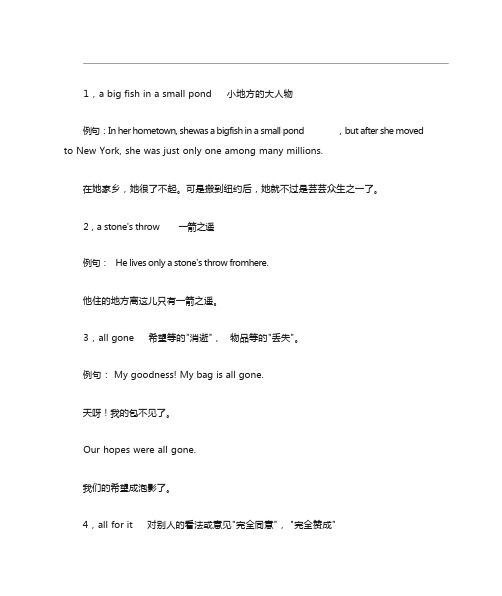
1,a big fish in a small pond 小地方的大人物例句:In her hometown, shewas a bigfish in a small pond ,but after she moved to New York, she was just only one among many millions.在她家乡,她很了不起。
可是搬到纽约后,她就不过是芸芸众生之一了。
2,a stone's throw 一箭之遥例句: He lives only a stone's throw fromhere.他住的地方离这儿只有一箭之遥。
3,all gone 希望等的"消逝",物品等的"丢失"。
例句: My goodness! My bag is all gone.天呀!我的包不见了。
Our hopes were all gone.我们的希望成泡影了。
4,all for it 对别人的看法或意见"完全同意", "完全赞成"例句: Go ahead with your plan. I'm all for it.进行你的计划吧,我完全赞成。
5,all in all 常用的片语,表示"总的来说", "总而言之",例句: He has his faults, but all in all, he is a good guy.6,as clear as mud 不清晰,混乱例句: Your explanation is as clear as mud.你的解释一点都不清晰。
7,as soft as down 柔软如绒毛例句: I lay fast asleep on the couch, which was as soft as down, and did not wake until late in the morning.我在软如绒毛般的长沙发椅上睡着了,一直睡到早晨很晚才醒来。
idoms英语习语
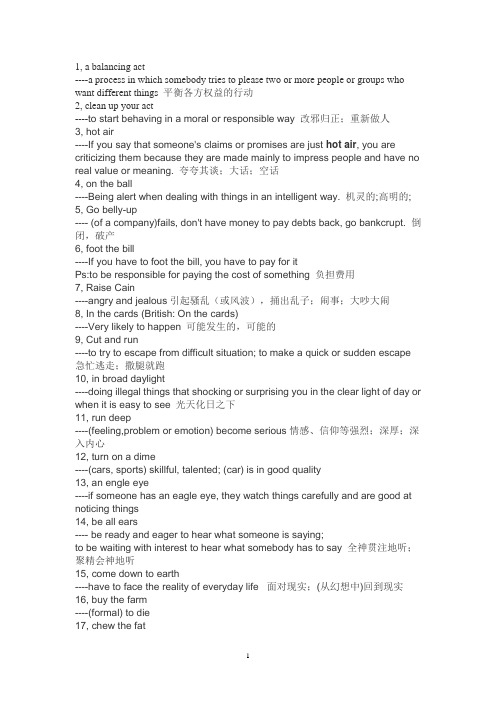
1, a balancing act----a process in which somebody tries to please two or more people or groups who want different things 平衡各方权益的行动2, clean up your act----to start behaving in a moral or responsible way 改邪归正;重新做人3, hot air----If you say that someone's claims or promises are just hot air, you are criticizing them because they are made mainly to impress people and have no real value or meaning. 夸夸其谈;大话;空话4, on the ball----Being alert when dealing with things in an intelligent way. 机灵的;高明的; 5, Go belly-up---- (of a company)fails, don't have money to pay debts back, go bankcrupt. 倒闭,破产6, foot the bill----If you have to foot the bill, you have to pay for itPs:to be responsible for paying the cost of something 负担费用7, Raise Cain----angry and jealous引起骚乱(或风波),捅出乱子;闹事;大吵大闹8, In the cards (British: On the cards)----Very likely to happen 可能发生的,可能的9, Cut and run----to try to escape from difficult situation; to make a quick or sudden escape 急忙逃走;撒腿就跑10, in broad daylight----doing illegal things that shocking or surprising you in the clear light of day or when it is easy to see 光天化日之下11, run deep----(feeling,problem or emotion) become serious情感、信仰等强烈;深厚;深入内心12, turn on a dime----(cars, sports) skillful, talented; (car) is in good quality13, an engle eye----if someone has an eagle eye, they watch things carefully and are good at noticing things14, be all ears---- be ready and eager to hear what someone is saying;to be waiting with interest to hear what somebody has to say 全神贯注地听;聚精会神地听15, come down to earth----have to face the reality of everyday life 面对现实;(从幻想中)回到现实16, buy the farm----(formal) to die17, chew the fat----to chat with somebody in an informal and friendly way(长时间)闲聊,闲扯18, dead on your feet----completely exausted19, play someone at their own game----to behave in torturing someone in the same way they treat you20, give and take----If something needs to give and take, which means it needs compromise to be successful.Ps:willingness in a relationship to accept what somebody else wants and give up some of what you want 双方迁就;相互让步;互相忍让21, have a go at someone----to fight someone22, try your hand at something----to try to see whether you like it or be good at it初试身手Ps:to do something such as an activity or a sport for the first time23, play hard ball----if someone plays hard ball, he would do anything to achieve his goal even being harsh or unfair24, bury the hatchet----People who have a quarry bury the hatchet, they began to be friendly. Ps:to stop being unfriendly and become friends again 消除隔阂(重归于好)25, break the ice----If someone breaks the ice at party or in a new situation, he intends to help others relaxPs: to say or do something that makes people feel more relaxed, especially at the beginning of a meeting, party, etc. (尤指聚会等开始时,用言语或行动)打破隔阂;打头说话;打破僵局26, put something on ice----to postpone搁置某事27, the ins and outs----the ins and outs of a situation means all the complicate details or facts (尤指复杂或难的)全部细节,详情Ps:all the details, especially the complicated or difficult ones28, the jewel in someone’s crown----if you focus on the jewel in someone’s crown, you consider the best thing they have or achieve and they may be proud of it. 最有吸引力(或珍贵、有价值、自豪)的东西29, go for the jugular---- to attack opponents’ or enemies’ weakest point during a discussion, in an aggressive way (讨论中咄咄逼人地)抨击对方的致命弱点,攻其要害30, get a jump on someone----to do something before they do it so that you gain an advantage over them (比某人)优先一步31, make a killing----make profits very quickly and easily发大财;获取暴利;财运亨通32, the kiss of death----If a particular event is the kiss of death, it is certain to cause fail or ruin it Ps:an event that seems good, but is certain to make something else fail 貌似有利却肯定会在别处导致失利的事物;表面有利实则有害的事物33, know something insight out----know extremely well34, have the last laugh---- to be successful when you were not expected to be, making your opponents look stupid (在本未指望时)笑在最后,取得最后胜利35, have legs----(plan,story or idea) have legs,it is likely to work or be true 站得住脚的36, out on a limb----If you go or are out on a limb, you do something risky or uncertain 冒险;处于险境Ps:not supported by other people 无人支持;孤立无援37, make your mark---- to do something to cause you to become noticed or famous 成名38, shoot the messenger---- a metaphoric phrase used to describe the act of lashing out at the (blameless) bearer of bad news39, go the extra mile----make a special effort to do or achieve something多付出代价;孜孜以求;加倍努力40, stick your neck out----to say or do something that others may afraid to say or do, because it may cause troublePs: to do or say something when there is a risk that you may be wrong 做不保险的事;说不保险的话;冒险41, a nest egg----a sum of money that you are saving for particular purposes储金; 为将来需要而储蓄的钱;未雨绸缪42, in a nutshell----summarizing something in a sentence 简而言之;概括地说43, at odds with someone----disagree with someone与某人意见不一致44, a tall orders----If a task is a tall orders, it is very difficult45, on the same page----in an agreement aboout what they are trying to achieve对事情看法相同Ps: In broad agreement or sharing a common general understanding or knowledge46, watch paint dry----doing something like watch paint dry, means you find an activity extremely boring47, hit pay dirt----find and achieve something inportant, valuable发现财源,找到成功的机会;作出有用的发现48, call it quits----decide to stop doing something or stop being involved in something决定停止Ps:to decide to stop doing something49, take a rain check----refusing your offer or invitation politely and saying that they would like to come next(婉辞邀请)下次吧,以后再说50, take the rap----to accept the blame and responsibility, although it is not his fault代人受罪(无辜)受罚;背黑锅51, behind the scenes---- done in private or sceret wayPs:in a way that people in general are not aware of 秘密地;背地里;在幕后52, from the scratch----create something new从零开始;从头开始53, keep tabs on something----make sure where he is and what he is doing in order to control him监视;密切注视54, not for all the tea in China----definintely don't want to di itPs: not even for a great reward 无论报酬多高都不;无论有多大好处都不55, up and coming----likely to be successful in the future有前途的;前程似锦的56, speak volumes----reveal or implise a lot充分说明;清楚表明57, hit the wall----can not go further or achieve something达到极限Ps: reach the pointwhen they are the most physically tired when doing a sport 运动时身体疲劳度达到极限58, not born yesterday----not as naive or as easily deceived as people think, not stupid(表示自己并不傻,不会轻信别人的话)不是没有经验的,不易受骗的;世故的;一点儿不傻59, march in orders----introduction in order to achieve goals or aimsBuy the farm,买一座农庄,听起来似乎是一件大好事,可你怎么也没想到,这个看上去没什么特别的说法居然表示“死去,遇害”。
英语学习中的常见谚语和习语
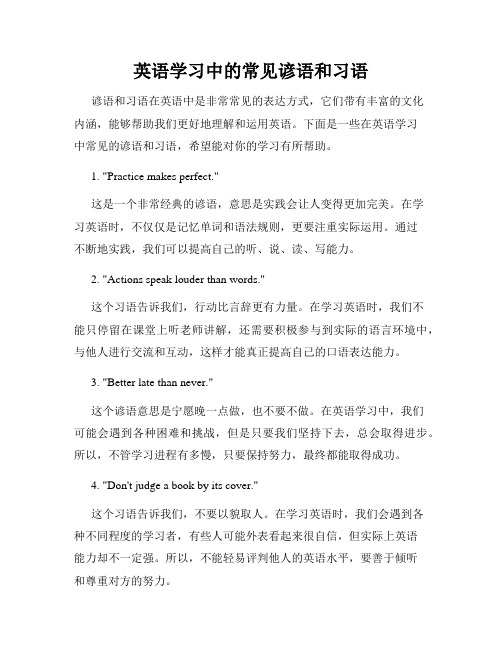
英语学习中的常见谚语和习语谚语和习语在英语中是非常常见的表达方式,它们带有丰富的文化内涵,能够帮助我们更好地理解和运用英语。
下面是一些在英语学习中常见的谚语和习语,希望能对你的学习有所帮助。
1. "Practice makes perfect."这是一个非常经典的谚语,意思是实践会让人变得更加完美。
在学习英语时,不仅仅是记忆单词和语法规则,更要注重实际运用。
通过不断地实践,我们可以提高自己的听、说、读、写能力。
2. "Actions speak louder than words."这个习语告诉我们,行动比言辞更有力量。
在学习英语时,我们不能只停留在课堂上听老师讲解,还需要积极参与到实际的语言环境中,与他人进行交流和互动,这样才能真正提高自己的口语表达能力。
3. "Better late than never."这个谚语意思是宁愿晚一点做,也不要不做。
在英语学习中,我们可能会遇到各种困难和挑战,但是只要我们坚持下去,总会取得进步。
所以,不管学习进程有多慢,只要保持努力,最终都能取得成功。
4. "Don't judge a book by its cover."这个习语告诉我们,不要以貌取人。
在学习英语时,我们会遇到各种不同程度的学习者,有些人可能外表看起来很自信,但实际上英语能力却不一定强。
所以,不能轻易评判他人的英语水平,要善于倾听和尊重对方的努力。
5. "Every cloud has a silver lining."这个谚语意思是每个困难都有其积极的一面。
在学习英语时,我们可能会遇到一些挫折和困难,但是只要我们积极面对,就能从中学到更多的东西。
每个错误和失败都是学习的机会,通过总结经验教训,我们可以不断提升自己的英语能力。
6. "The early bird catches the worm."这个习语告诉我们早起的鸟儿能抓到虫子。
英语俚语
Part 11. airhead(傻蛋): stupid person, idiot (Ex: "How could you forget the keys? You are such an airhead!")2. chilling(放松): relaxing, not doing anything that takes up a lot of energy (Ex: "I'm just watching some TV. Since there's no homework today, I'm just going to chill.")3. couch potato(电视迷): a person who watches too much television (Ex: "You've been watching TV all day. Don't be such a couch potato and get up!")4. flick(电影): film; movie (chick flick: movies for girls. Ex: "Let's watch a chick flick at the sleepover. Which one should we see? Mean Girls or The Notebook?")5. get it(明白): to understand something (Ex: "Your shirt looks really bad. I'm serious, it looks so ugly." "Okay, okay. I got it the first time.")6. jock(体育高手): someone good at sports (Ex: "Tristan is the biggest jock in school. He's also the most popular guy among girls.")7. loaded(富有): someone with a lot of money (Ex: "Did you see the car that drove her to school today? Her family must be loaded.")8. party animal(派对狂): someone that loves parties or go out to clubs (Ex: "You've been partying every night this week. You are such a party animal!")9. rip off(宰客): a fraud, something that isn’t actually worth the amount you paid for it (Ex: "I bought these jeans for $100." "Really? I got the same ones for only $50!" "Wow, I got ripped off!" "Yeah, what a rip off.")10. sweet(很棒): excellent, cool (Ex: "Hey, can you help me decorate the school gym for the dance?" "Yeah sure!" "Sweet, thanks!")11. turn-on(诱惑): something that attracts you to someone (Ex: "That guy can sing while playing the guitar. That is definitely a turn-on for me.")12. up for it(愿意做某事): to be willing to do something, and have a good time (Ex: "I really want to go bungee jumping. Want to go with me? Would you be up for it?")13. wicked(非常好): excellent, cool (more common among British speakers) (Ex: "That was so wicked! Can you do that again?")Part 2美语中有很多常用的口语,虽然都是由简单的词组成,但它们的意思却往往让学习英语的人感到不解。
英语习语与西方文化
英语习语与西方文化
英语习语是英语中常用的短语或惯用语,通过它们可以更好地理解和使用英语。
很多英语习语和西方文化有着紧密的联系,下面将介绍一些常见的英语习语并解释与西方文化的关系。
1. A piece of cake(小菜一碟)
这个习语用来形容一个任务非常容易完成。
据说这个习语的起源是源自西方儿童游戏“踢小石块”,玩家必须在踢起小石块的同时保持平衡,因此被人形容为“小菜一碟”。
2. Breaking the ice(打破僵局)
这个习语意味着消除尴尬或创建轻松的气氛。
它的来源可以追溯到西方社交场合,当人们第一次见面时,通常会通过交谈来破冰打开话题。
4. Let the cat out of the bag(泄露秘密)
这个习语来源于中世纪欧洲的市场,买家通常会将活猪装在袋子里带回家。
如果发现在袋子里的实际是一只猫而不是猪,这就暴露了欺骗的行为。
5. Pay the piper(付出代价)
这个习语意味着因为某种原因而有所付出。
它的来源可以追溯到西方传统,当人们想要享受音乐或娱乐时,必须支付艺术家的报酬。
6. Skeleton in the closet(不可告人的秘密)
这个习语源自旧时代的欧洲社会,人们通常会把家里的死者埋葬在地下室里,这就是“骨架在壁橱里”的来历。
这些英语习语和西方文化之间存在着密切的联系。
通过了解这些习语的背景和起源,我们可以更加深入地理解西方文化以及其中的传统和习俗。
随着全球化的发展,西方文化对于世界其他地区的影响越来越大,掌握英语习语也有助于更好地融入国际社会。
最新英语习语流行语
1. I don't want to be the third wheel. 我不想当电灯泡.一般的自行车都只有二个轮子, 要是有三个轮子呢? 没错, 那第三个轮子就是多余的. 所以Third wheel 就是美语中电灯泡正确的表示方法. 还有一个**, 叫I don't want to be the third arm. 这里不是说“三只手”的意思, 而是和third wheel 一样, 都是电灯泡的意思.2. He is dating another girl on the side. 他同时脚踏两条船.我想把这句说成I have my feet in two boats 的人也不在少数吧! 其实正确的说法应该是像这样, He is dating another girl on the side. 或是你可以说He is dating another girl behind her back. (这个her 指的是他女朋友的意思)On the side 这句话你去餐厅用餐时也常用到, 指的是主菜之外的副餐, 比如说I'd like salad with dressing on the side. 就是说我要沙拉和沙拉酱. 或是Would you like a baked potato on the side? 要不要再点一份烤马铃薯啊?3. I am the one-woman kinda man. 我是那种从一而终的男人.在美国从一而终的人好像不多, 他们通常从高中就开始交男女朋友, 一直交到结婚, 中间不知改朝换代过多少次. 所以这句话是很难得听到的. 其实我比较常听的是one-man woman, 因为看来不论中外, 女生都比男生坚贞一点. kinda在口语中常用, 它是kind of 的简写, kinda man 就是说那样的男人。
可以省略不说.还有一种用法叫We are exclusive. 这个exclusive 指的是排他的意思. 所以当一对情侣说, We are exclusive时, 就是说我们心里只有对方一人, 我们都不会再去喜欢上别人.4. Those boys like to hit on me all the time. 那些男生老爱找我搭讪.Hit somebody 是说你打某人的意思, 但是hit on somebody 就不一样了, hit on somebody 是当作搭讪来解释. 常常电视剧里可以看到, 一个男的跑去跟一个陌生女孩多说了两句话, 那个女生就说: Are you hitting on me? 你现在是在跟我搭讪吗? 实在是很有意思。
英文常用谚语和习语
Proverbs1. A bird in the hand is worth two in the bush.一鸟在手,胜于二鸟在林His father thinks that a bird in the hand is worth two in the bush.他父亲认为得到手的东西才靠得住。
I suggest you stick to your present job. After all, a bird in hand is worth two in thebush .我建议你保留现职,毕竟,一鸟在手胜过二鸟在林,何必冒险!2.Absence makes the heart grow fonder.小别胜新婚They say that absence makes the heart grow fonder, but I wonder. I'm afraid if I'm away too long, He will forget all about me.人们都说久别情深,不过我有所怀疑,我害怕离开太久了,他会把我忘的一干二净。
3.All that glitters is not gold.发光的东西未必都是黄金But I also tell my children that all that glitters is not gold.但是我同样告诉我的孩子们“闪光的未必都是金子”。
4.Birds of a feather flock together.物以类聚Birds of a feather flock together, and therefore they are such good friends.物以类聚,所以他们能成为好朋友。
All his friends are dishonest . Birds of a feather flock together.他的朋友都是不诚实的。
- 1、下载文档前请自行甄别文档内容的完整性,平台不提供额外的编辑、内容补充、找答案等附加服务。
- 2、"仅部分预览"的文档,不可在线预览部分如存在完整性等问题,可反馈申请退款(可完整预览的文档不适用该条件!)。
- 3、如文档侵犯您的权益,请联系客服反馈,我们会尽快为您处理(人工客服工作时间:9:00-18:30)。
英语习语知多少:十个最常用的英语习语
某天,朋友跟一个老外说起自己刚分手的女友,对方看他难过,拍了拍他的肩膀对他说:“Don't worry about it man, girls like that are a dime a dozen!”
后来朋友跟我说起这件事仍然愤愤不平,说老外把她女友说成只值一块二毛钱!
其实,“dime a dozen”跟“一块二毛钱”没有半毛钱关系。
它是一句常见的英语习语,指的是something that is common and easy to obtain(天涯何处无芳草)。
和中文的成语一样,英文中也有数量众多的idioms,如果望文生义,可能就会产生交流中的误会。
话不多说,下面我们就一起来看看英文中最常用、最有趣的十个习语:
1. Piece of cake
例句:The assignment I just finished was a piece of cake.
这个例句说的并不是我刚完成的作业是烤一块蛋糕,而是指作业非常简单,a piece of cake就是指轻而易举的事。
2. Cost an arm and a leg
例句:That Louis Vuitton bag costs me an arm and a leg.
如果在LV买个包包要砍下自己的胳膊和腿,那这个社会就太可怕了!
其实,在英语中,如果说到某个东西要cost an arm and a leg,它表达的是某个东西非常expensive。
3. Break a leg
在你即将要走进考场对付讨厌的微积分考试前,你们班上成绩最好的那个同学突然走过来对你说了句“Break a leg!”
“这个傲娇鬼”,你忍不住在心里暗暗抱怨,“成绩好就可以这样诅咒别人吗?”
但其实那个学习好的傲娇鬼却并不是在诅咒你,因为在英文中,break a leg 其实是good luck的意思!
4. Hit the books
例句:The final exam is coming, I might need to go to the library and hit the books.
什么?你要去图书馆打书?!就算期末考再可怕也不能把焦虑发泄在书本上啊...
如果你正这么想,那么你就误解这个习语的意思了。
其实,hit the books 指的是study,所以例句说的意思是:期末考试就要来了,我可能也该去图书馆看看书学习一下了。
5. Let the cat out of the bag
这个世界上怎么会有人把猫放在袋子里?亲,要是你这么想就out了!
在英语中,let the cat out of the bag means to disclose a secret that was supposed to be kept(爆料出某个秘密).
6.Hit the nail on the head
这个习语的意思是doing or saying something that is precisely right,中文中有表达叫“正中红心”或“一针见血”,基本和hit the nail on the head是对应的。
7. When pigs fly
大家见过猪在天上飞吗?从来没有吧?当然我也没见过。
其实,这个短语说的就是基本不可能发生的事。
例句:
-- Do you think you can ever win the lottery? (你觉得你会中彩票大奖吗?)
--Yes. When pigs fly. (等猪会飞的时候我就会中奖了)
8. You can't judge a book by its cover
大家曾经有没有因为一本书的封面好看而买书?小编我就属于这样的人。
但是在英文中,judge a book by its cover 却和书没有太大关系,它的意思是“以貌取人”。
例句:"He dresses in plain clothes and drives an old car. Who would know he is the richest man in town?" "You can't judge a book by its cover."
9. Bite off more than you can chew
It means to attempt to take on a task that is too much for you to handle(眼大肚小).
例句:Our boss bit off more than she can chew when she promised the client we'd have the project ready by next week. It requires at least two weeks!
10. Scratch someone's back
挠背脊是件体力活没错吧?既然给自己挠背脊都那么麻烦了,我们为什么还要帮别人挠?
那是因为这样的话以后自己背痒的时候才会有人你挠。
所以这个短语的意思就是预支自己对他人的帮忙,以防日后自己不时之需时可以有人情债可收。
也就是中文中常说的:投之以桃,报之以李。
例句:I don't mind driving this time, she's scratched my back plenty of times.。
